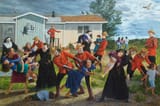>>17832054 (OP)
Native Americans were unfamiliar with European colonization and they were no where near as unified, so the message couldn't spread.
During the Warring States Era, while the warlords were waging war against each other, merchants and messengers still spread. And in theory, Japan was unified state under the Emperor/Shogun/Imperial Regent/whatever. The Japanese had heard about Europeans from Ming who traded with them. There was also a general distrust of them. Religious groups, especially armed monks and monasteries, were viewed with disdain by the warlord class who were basically warlords themselves. Displeased monasteries would literally dump ancient relics in front of castles to rile up the people, who believed the local gods and spirits were angry with them. So monks were not well liked by the warrior class.
So when European traders come, wanting to establish religious trade missions, there was a lot of skepticism. It's a big deal with Nobunaga basically allowed Christians to preach, most probably to secure better access to guns. The Otomo Clan in the West also leased land to Christian missionaries (Jesuits). When they immediately fortified their lands as basically a church with a castle around it, every other samurai warlord immediately got suspicious of their intentions.
Luckily for the Japanese, the Christian emissaries were not united or well supported post-1580. The reigning pope pre-1580s was pro-Jesuit and thus sponsored Jesuit missions into Japan. After his death, the new Pope didn't favor the Jesuits, preferring to focus on the Franciscans and their efforts in the Philippines. So after the 1580s, the Catholics lost interest as the Jesuits were not supported and many recalled.
